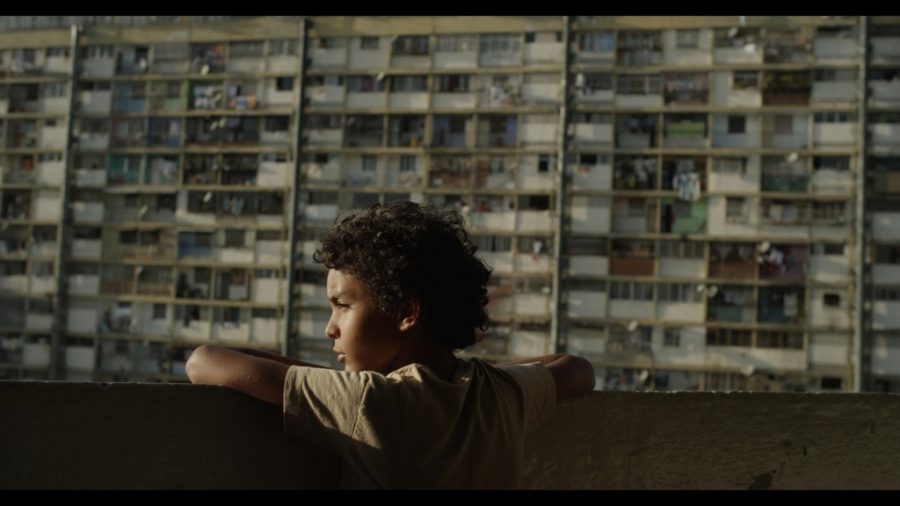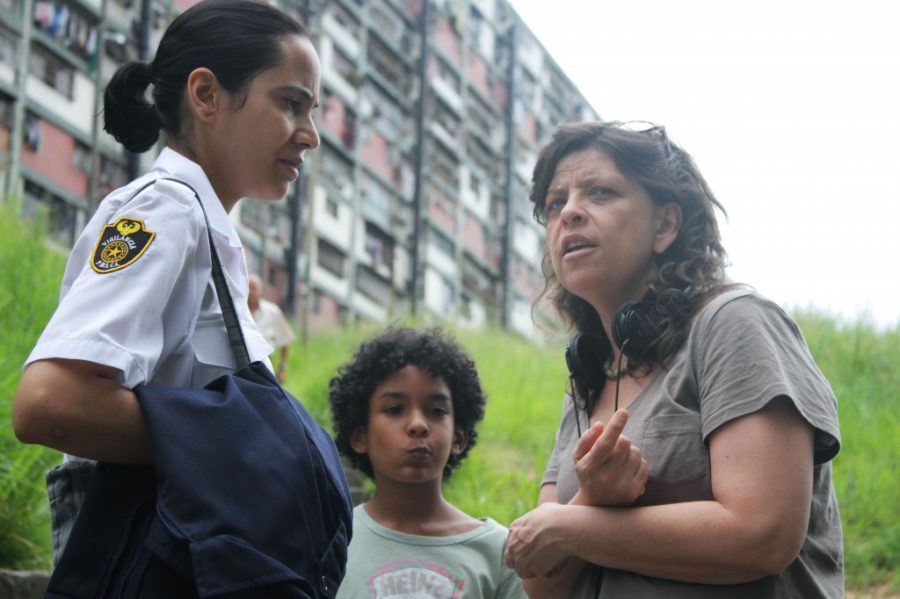
 Nine-year-old Junior (Samuel Lange) wants nothing more than to have his hair straightened for his school picture, but his mother Marta (Samantha Castillo) sees this is a sign of defiance. While the boy recurs to rudimentary methods to get rid of his curls, his mother worriedly visits the doctor to ask him how to fix her son. In Caracas-set, “Bad Hair”, writer/director Mariana Rondón paints an acute portrait of the pains of growing up and finding your identity. Interwoven with a strong political message denouncing the Venezuelan government’s rabid fanaticism towards its now-deceased leader, the film is full of an irrepressible energy conveyed through its astounding performances.
Nine-year-old Junior (Samuel Lange) wants nothing more than to have his hair straightened for his school picture, but his mother Marta (Samantha Castillo) sees this is a sign of defiance. While the boy recurs to rudimentary methods to get rid of his curls, his mother worriedly visits the doctor to ask him how to fix her son. In Caracas-set, “Bad Hair”, writer/director Mariana Rondón paints an acute portrait of the pains of growing up and finding your identity. Interwoven with a strong political message denouncing the Venezuelan government’s rabid fanaticism towards its now-deceased leader, the film is full of an irrepressible energy conveyed through its astounding performances.
“Bad Hair” had its US premiere at the Tribeca Film Festival, where we had the opportunity to sit down with Rondón and producer/editor Marité Ugas who talked about the film’s inception, shooting in the Caracas projects and working with first time actors.
StageBuddy: What inspired you to write the story?
Mariana Rondón: I wanted to talk about respect; towards each other, towards our differences and how a lack of respect always leads to violence. I started looking for signs in my daily life, violent gazes and expressions that inspired violence. Even the smallest expressions could mean great harm for someone who’s just starting to grow up.
SB: Can you talk about how you developed the screenplay?
MR: We were in rehearsals for three months, so the screenplay as such, only appeared after they had assumed these characters. The characters were very clear from the start.
SB: How easy or hard was it to get funding to produce the film?
Marité Ugas: In Venezuela, as in most of Latin America, the main funds come from film institutes, in our case it’s called CENAC (Centro Nacional Autonomo de Cinematografia) and twice a year they invite people to submit their projects and an international committee selects the projects they want to develop. If they choose your film, sometimes it means securing up to sixty per cent of the total budget. After that, we also had the support of Ibermedia, which supports films being co-produced between two Latin American countries. We also had support from the World Cinema Fund and Global Film Initiative.
SB: Since the film is so political, I was wondering if you’d had any issues with censors in Venezuela?
MU: Since the financing came from an autonomous institute there’s no kind of censure. In fact everything is going quite well even in terms of distributing the film.
SB: How did you prepare Samuel to play this part?
MR: Other than Beto Benites, all of the other actors were making their film debut, so this was nice because they were all equals. We had to work with all of them in the same way, besides they were all very different from the characters they played. We worked as a team to build those characters, especially to work on expressing the violence. It was essential to me that we all developed a common language that would allow us to touch on these issues, without affecting their lives as actors.
When it came to the subject, I spoke to psychologists, to his parents, grandparents etc. and there came a point when Samuel said “come on Mariana, I know what we’re talking about”, regardless we paid special attention to him. Samuel really wants to become an actor, he did everything in his power to get the part. He was the very first boy I saw when we were casting the part, I ended up seeing a hundred more boys and within that time Samuel came back five times. He saw what I liked from other of the boys and he would emulate it, so by the fifth time he came by he was exactly the actor I needed to play Junior. His mother also works in film, so he feels very comfortable in this world.

SB: Can you elaborate on building this world they live in? Their apartment for example feels so lived in. How did you achieve this with the art director?
MR: All of this came very well defined from the production. Marité focused our budget on working with the actors, so we took a long time to make these spaces our own, we wanted the crew to feel comfortable. While we were doing pre-production we also developed relationships with the neighbors of the apartment building. We would go to the neighbor and go “hey, can we borrow or rent that lamp for our film?”, and we built our sets using elements from this world we were already in.
SB: Something that made quite an impact on me was how using very little resources you lay out these complex worlds in the film. For example, just by the sound of gunshots we understand that these characters live in a terribly dangerous place. Can you talk about shooting on this location specifically?
MR: There’s a long tradition in Venezuela to shoot in these places, because they’ve become symbols of sorts. We had a direct connection with this place because many of the crew members actually lived there.
MU: We didn’t arrive like a crew of gypsies who invaded the place, instead little by little you become part of this place. Many people who end up working as assistant producers or working in catering were neighbors, who will also use this project as their first step towards building a career in the industry. This happened in the two neighborhoods where we shot “Bad Hair”.
SB: Recently some of the best films in Latin America are being made by female filmmakers and I liked the way in which in “Bad Hair” you subvert the common gender roles. Junior’s mother is a security guard, which is thought of a “man’s job”, who resents her son for wanting to be an artist.
MR: Being a security guard is one of the most common jobs in Venezuela, of course there are many more men than women. Marta is forced by this matriarchal society to play two roles: she’s a mother and a father. All she’s really asking of her son is to do what she does, to fulfill his role. She might be taking on this masculine role, in order to protect herself, to be safe in this place.
SB: How did you end up choosing Henry Stephen’s “Mi Limon, Mi Limonero” as the song Junior rehearses during the film?
MR: I picked that song because I learned how to dance with that song. This song became very famous in Venezuela in the 1970s and it wasn’t until we paid for the rights to use it in the film that we learned that it was a Brazilian song from the 1930s.
SB: The film is being discussed as being a “gay film”, however you never label any of these characters.
MR: We wanted for it to be a balance between how we saw the characters and how the audience would see them. We wanted for them to approach the film from a place of non-judgment, so that people watching the film would come to their own conclusions using their own experiences. Someone recently said the film wasn’t about homosexuality but about homophobia, and I really liked that.
SB: How did you achieve the right balance between making an entertaining film that’s also deeply political?
MR: While I believe the movie is political, I believe it’s more about the effects of politics on the soul. The film doesn’t intend to pass judgment but to show how countries like Venezuela, living under a state of extreme polarization, end up having effects in realms beyond politics, by also seeping into people’s homes. The news clips we show in the film were actually being shown as we were shooting. We didn’t move anything around.
SB: So far what’s been your favorite thing about bringing the film to international festivals?
MU: We were absolutely delighted, when we realized that shortly after our very first screening at the Toronto International Film Festival, people started talking about the film and we realized its future didn’t depend on us anymore. The film had received a life all its own. The second screening was sold out, the third one was crazy and it became the film that arrived super small and then became one of the most talked about. After that, we went to San Sebastian, where Todd Haynes and his jury unanimously gave us the Golden Seashell. Everything has been wonderful ever since. We also have secured distribution in over 24 countries! We couldn’t be any prouder of it.
“Bad Hair” will play at Film Forum during the fall.